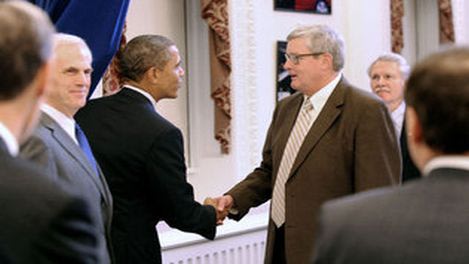Last year, Bruce Cochrane was recognized by President Obama at his State of the Union Address for bringing industry back to the United States by opening a bedroom manufacturing facility in Lincolnton, North Carolina. During the speech, Cochrane sat next to the First Lady and met all of the dignitaries, sniffing the rarified air of Washington, D.C.

Today, after investing $5 million of his own money, Cochrane announced his factory would be closing, less than a year after being recognized. No spring chicken in the industry, Cochrane's furniture roots date back to 1850. This is not a case of someone getting in over his head. He has a great reputation, great products, and no shortage of goodwill. What he didn't have was the ability to compete making U.S. made goods.
Also, in today's paper, Henredon Furniture announced they would be closing a plant in Mount Airy, North Carolina. It seems the land of Andy Griffin is the latest victim of a company longer able to compete, at least with products made in America. 110 people will be looking for jobs.
As a matter of full disclosure, our company produces goods offshore. We recognized long ago we could not compete with foreign made products. While it is good to have the Made in the U.S.A. sticker on your products, it seems only pipe dream to be able to succeed.
Best wishes to all of you at Lincolnton Furniture and Henredon. You fought the good fight. You made good products. Your legacy is intact.

